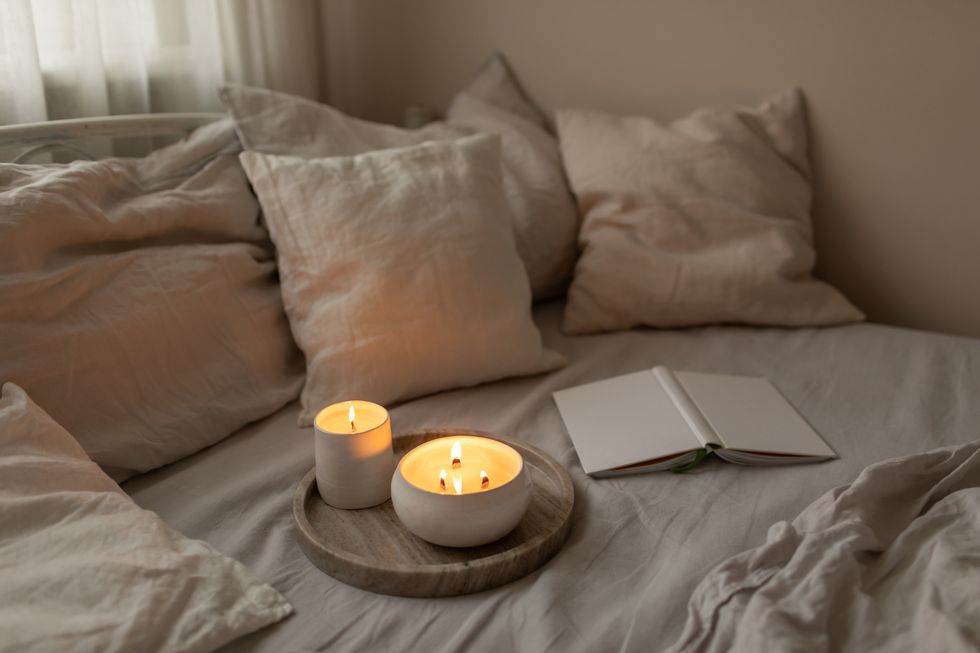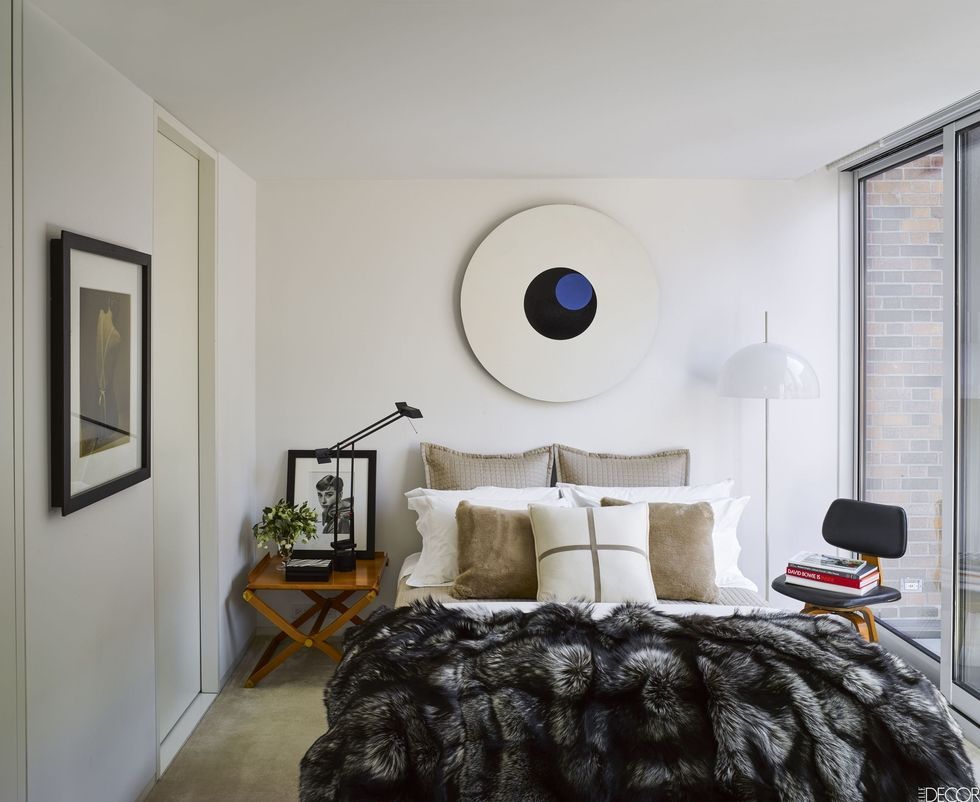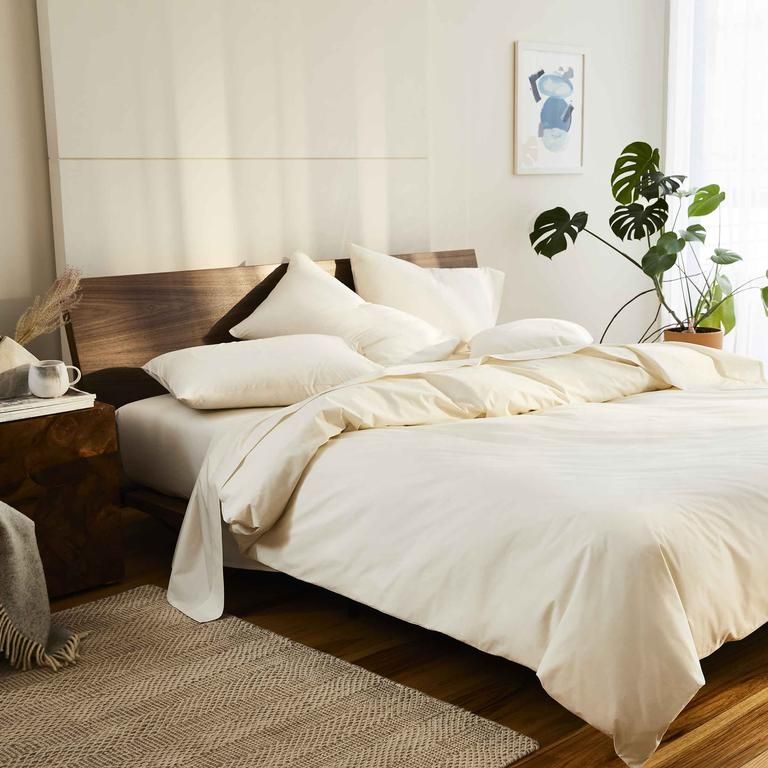You’ve longed for it all day, that moment when your head hits the pillow and you wistfully drift away to dreamland. Except that you don’t. Your mind is going 100 miles an hour and somehow you find yourself in the kitchen at two in the morning shamelessly spooning leftover chocolate-on-chocolate ice cream and questioning all of your life decisions. But before you join the Peace Corps or go on an Eat, Pray, Love journey abroad, a more subtle cure for your insomnia might be all you need to be back in the well-rested races. We’re talking about a bedroom-vibe boost, the feng shui way.
For centuries, the Chinese believed that there were invisible forces at work all around us, forces that, when optimized within an occupied space, can supercharge our well-being. Some refer to it as Chinese geomancy; others pass it off as early Taoist ideology. But most know it as feng shui. It’s a millennia-old belief system that—in our screen-driven, fast-paced, pandemic-and-politics-burnout moment—is more than ripe for reexploration. And the bedroom—your place of rest, romance, and rejuvenation—is the perfect place to start.
For practical tips on how to feng shui your bedroom, we checked in with experts Anjie Cho, the author of Holistic Spaces, and New York City–based practitioner Julia Sarasola. Read on to get inspiration for good mojo all around and some blessed shut-eye—in style. But by all means, still take that trip to Bali.
Aim for a Serene Environment
Regardless of your decorating style, your goal should be to craft a serene bedroom. “The important thing about feng shui is how a space makes you feel,” Cho says. “A bedroom that has good feng shui feels comfortable, nurturing, supportive, and like home. Your environment has so much of an effect on your prosperity, your livelihood, well-being, and health.”
Lighten Heavy Architectural Features
Sarasola advises against sleeping under weighty architectural features like low-hanging beams and ceiling fans, sloped ceilings, and even soffits. “It can create a heaviness and pressure that are not ideal to be sleeping under,” she says. If your bedroom has these features, an easy fix is to paint them a light color to match the ceiling, which will minimize their visual and spiritual weight.
Balance All Five Elements
Feng shui divides the world into five elements: wood, fire, earth, metal, and water. If your room doesn’t feel quite right, Sarasola suggests balancing these elements out through your bedroom’s color palette, shapes, decorative objects, and textures. “Add wooden furniture, incorporate more animal prints, or introduce candles into the space,” she says. “However you want to make it your own, incorporating these elements of the earth can add warmth and create an overall feeling of grounding.” Some other ideas include adding an abstract landscape painting, bringing in a mini water fountain, or investing in a marble candle vessel.
Invest in a Large Bed
Feng shui is all about the interaction of humans and their environments, sometimes in the most logistical of ways. Feng shui experts recommend investing, if possible, in a full-size bed or larger. “A larger sleep space allows chi to circulate smoothly in the room,” says Sarasola. Maximum space in which to relax is key in this equation, but it’s a fine balance. If a king bed would sacrifice of foot traffic space, a smaller queen bed could offer more optimal flow overall for the room.
Aim for a Serene Environment
Regardless of your decorating style, your goal should be to craft a serene bedroom. “The important thing about feng shui is how a space makes you feel,” Cho says. “A bedroom that has good feng shui feels comfortable, nurturing, supportive, and like home. Your environment has so much of an effect on your prosperity, your livelihood, well-being, and health.”
Establish a Commanding Bed Position
“The bedroom is your place to rest in preparation for the following day, and we actually spend one third of our lives doing so,” Sarasola says. “It’s important that you adapt your space to yin energy, the soft, restorative energy that balances out the more active yang energy.”
One of the simplest ways to do that is by placing your bed in what is called the command position—when you are sitting up in bed with your back against the headboard, you should be able to see the door without being directly in line with it. That usually means you’re looking diagonally toward the door. “You don’t want your feet positioned straight toward the door, and you don’t want your headboard to be in line with the door,” Cho says. You also want the bed to be positioned as far from the door as possible. “The symbolism here is that you are positioning yourself to face your life and opportunities from a grounded vantage point, eliminating surprises and feelings of unrest,” Sarasola adds.
Add a Supportive Headboard
“Who doesn’t like a little extra support?” Sarasola asks. “Choosing the right headboard is one of those simple changes that you will feel instantly, providing you with a better night’s sleep and an overall sense of security.” Go for a solid headboard over one that is made of vertical bars or slatted wood. Cho suggests wood or upholstered headboards, but says to avoid metal perforations, since “they are often designed like bars that give off a sense of being imprisoned.” Make sure it’s something you can firmly lean against and is ideally attached to the bed. (Bonus points if the headboard matches your comforter and bed sheets.)
Balance in All Things
Balance is the ultimate feng shui principle, and no place is more suited to symmetry than the bedroom. “If you want to attract a partner or are in a relationship, the principle of balance is important in a bedroom,” Cho says. Having space, nightstands, sconces, or artwork on both sides of the bed are just a few eye-pleasing examples. The goal should be to create enough space for you and a partner. And good news: “They don’t have to be symmetrical,” Cho says. “Balance gives you more freedom.”
Place Mirrors Judiciously
Some feng shui experts stipulate that mirrors and all of those reflections can be too energetic for a restful space and can disturb your sleep. Still not sure? One suggestion is to cover the mirrors for a few nights and take note of how you sleep. If you sleep soundly with them covered, you might consider at least moving them to a wall that doesn’t face your bed.
On the other hand, per feng shui principles, mirrors can activate just the right energy in a room when they are used sensibly. “They can guide and direct the flow of energy, absorb or expand, reflect, protect, strengthen, and even draw in auspicious chi [energy],” says Sarasola, who suggests hanging or aligning your mirrors so that the head or neck isn’t cut off when gazing into them. “The alternative might cause headaches or neck pain, and can even show up as a lack of being able to express yourself or be heard,” Sarasola says. Sarasola advises couples to hang a large round mirror above the bed to invite harmony, compassion, and patience into the relationship.
Show Off Your Curves
“In feng shui we call sharp corners poison or pointed arrows,” says Sarasola. “[Corners] can deplete our energy and even leave us feeling like we are under attack.” Corners or pieces of furniture that meet at an angle of 90 degrees or less should not cross through the area of the bed if you were to draw an invisible line from the angle. If furniture placement options are limited, you can also place a small plant or piece of fabric that cascades over the corner to soften it.
Curate Your Bedroom Library
Feng shui experts generally agree that it’s best to keep books out of the bedroom, as they can be very “active.” But that decision ultimately lies in the nuance of your relationship with the books. A novel that helps you relax is appropriate, but avoid a full library of books, which can be a distraction. “If you have books in your bedroom that bring you joy, that’s amazing,” says Sarasola. “Otherwise, an accumulation of items that bother or stress you out when you look at them, or read them for that matter, can represent fears, obstacles, and even create a buildup of stagnant chi. When left unaddressed this can result in anxiety, insomnia, and even illness.”
There’s only one hard-and-fast rule here: when you look around your bedroom, you should feel happy, calm, and supported by the items surrounding you. As for your books, we’ll let you decide where that Steve Jobs biography belongs.
Opt for Organic Where Thread Count is Concerned
Organic bedding is the best option for a bedroom that adheres to the principles of feng shui. “There are a lot of ethics involved in how conventional bedding is created and manufactured, so all of that energy is interwoven into the materials you choose to have in your home,” Cho says. “Do your best to buy the most ethical, nontoxic materials that you can afford, because that will affect your life.”
As for colors, Cho is partial to white bedding. “It’s a blank canvas that lets you bring in different accents like pillows,” she says. “But if you want to attract a partner, you can have pink bedding. If you want to have more passion for life, you can use red bedding.”
Accentuate Natural Light
Beware of getting too much vitamin D—said no one ever. As it turns out, the principles of feng shui are in line with the doc’s orders. “Natural light is incredible life-force energy,” says Sarasola. “Having a bedroom rich in life force supports and nurtures us during our waking and non-waking lives.” Choose window dressings that maximize natural light and can be easily pulled back. Don’t block your windows with bulky furniture.
At night, lighting that is soft and soothing can really set the right tone. “One particular type of lighting that is good in feng shui is uplighting, especially if someone is depressed,” Cho says. She recommends 2700-kelvin versus 3000-kelvin lights, as they add warmth to an interior. And, of course, candles really level-up an environment, creating warmth and intimacy.
Find a New Home for Aunt Phyllis’s Portrait
Your bedroom isn’t the place for family photos, says Cho. “Your bedroom is about connecting with your partner, and pictures of family members aren’t that welcoming and sexy.” Avoid posters from movies or bands, and go for abstract art that contains soothing colors or images of serene locations. “You can look to colors, shapes, and the subject matter of an image for extra support,” says Sarasola. “Shades of green and images of strong upward-moving trees, for example, can be very uplifting and bring the energy of growth.”
The type of artwork you select for your bedroom is a personal and emotional decision that ultimately lies with you. “I often tell my clients to let their intuition guide them on what they are drawn toward,” says Sarasola. “Check in with yourself about what kind of emotions your artwork evokes in you. Overall, feelings of hope, stability, joy, and peace will foster a great sense of harmony in the bedroom.” And don’t be afraid to reflect and adjust to what you need right now, as that can change amid different seasons of life.
A word on placement: Your largest piece of art should be hung on the wall facing the foot of the bed so you will see it upon going to sleep and waking. Artwork should not be placed too low, Cho warns: “It can bring you down emotionally.”
Consider Bed Dimensions
Feng shui even has stipulations on mattresses. First, let’s talk size. Full and queen-sized beds are recommended for people who spend any amount of time with a fellow midnight companion (we don’t judge). King-sized mattresses often have two separate box springs, which can create distance and a split in the relationship. For those who love the biggest option, look for a bed frame with a single box spring.
Having your bed at a reasonable height, too, is an essential component of good feng shui. A good rule of thumb is to keep 18 inches of open space between your mattress and the floor. Unless you’re a certain Disney prince (in which case, you’ve got all the luck you need), you want to feel grounded, not like you’re floating on a magic carpet.
Ground the Space With a Rug
Speaking of carpets, feng shui experts agree that rugs help bring gravity to the bedroom. Square and rectangular rugs are the most common rug shape. Round rugs are believed to promote positive energy, as they have no corners and therefore don’t disrupt the room’s flow. Whatever color or shape you choose, including a rug in your bedroom is a major way to ground the space.
Reduce Electronics and Technology
Deciding whether or not to include a television in the bedroom all comes down to your lifestyle. If you typically experience difficulty falling asleep, leave it out of the bedroom or conceal it with a wood or fabric panel. “We are in a day and age where we are surrounded by electronic devices,” says Cho. “There are ways to gracefully conceal the television and not have it be a distraction from your sleep.” But fear not, you can binge Love Island elsewhere.
Make Smart Curtain Decisions
There’s no hard-and-fast rule for curtains, but a nice rideau can definitely function as a good diffuser or divider. “If you live on a noisy street, curtains can act as a buffer between the active yang energy of the street and the gentle yin energy of the bedroom,” says Sarasola. They can also provide privacy, visually soften a space, and add texture or a pop of color to a room.
Avoid a Multipurpose Bedroom
We get it, you’re preaching to the choir over here. (City dwellers, can I get an amen?) Space is a commodity and you might not have a separate space for your work-from-home situation, your aspirational gym corner—hell, even your kid’s crib. But some smart adjustments in any corner outside of your sleep space might be worth the effort. Feng shui 101 dictates that your bedroom should be your bedroom and nothing else, because you don’t want to train your mind to be more active in the room designated for relaxation and sleep. An imbalanced chi does not a zen person make.
Bring in Plants With Rounded Leaves
Being surrounded by nature is always relaxing, so consider bringing the outdoors in by making plants part of your bedroom decor. But not all plants reflect the philosophy of feng shui. “It is best to stick with plants that have soft and rounded edges,” says Cho. For instance, succulents with heart-shaped leaves or snake plants, which are known to give off more oxygen at night, can make a space feel more calming.
Avoid Water Features
According to feng shui, water is a faux pas in the bedroom. Avoid placing a water feature—a fountain or a fish tank—in your bedroom. Also avoid hanging artwork that incorporates water scenes such as lakes, rivers, or waterfalls. Water disrupts the serenity you’re working to accomplish as it has active chi energy. Plus, water extinguishes fire, which is unfortunate for passion and libido. Tsk, tsk.
Consider the Color Effect
The art of feng shui encompasses a whole study in color theology. Different colors have different energies: blue and black help us to concentrate, green invokes decisiveness and action; and white supports mental clarity and productivity.
Most people think an all-neutral palette is the key to a good feng shui bedroom, but Cho says you can decorate with any hues that resonate with you. “Neutrals tend to be more earthy-colored, and the earth represents support, stability, and nourishment,” Cho says. “If that’s what you are attracted to and what you need, that is a great palette. It’s more about your taste.” In other words: you do you.
Pare Down and Zhuzh Up
Last but not least, take time to clear the bedroom regularly and conduct regular decluttering sessions. There’s no denying that clutter creates stress, and good feng shui calls for keeping it at bay. “You want to have open space, especially under your bed, because that creates healthy energy and healthy chi,” Cho says. But if you live in a small space and have to use under your bed for storage, stick to soft, sleep-related items like bedding, pillows, and blankets. It’s not an area to keep items that are emotionally charged, whether it’s shoes, jeans that no longer fit, or photo mementos.
But tidiness is only half the equation to a cozy atmosphere. “You can smudge the bedroom [with sage] or even just diffuse oil to uplift for the best feng shui,” Sarasola says. “When I feel like I need an energy boost to start my day, I lean into citrus essences, like orange and bergamot, which inherently carry the characteristics of uplifting yang energy. And when I feel like I need more grounding or centering energy I go for sandalwood or lavender, which are more yin in their nature and perfect to carry you into a restful state.”
Additional reporting by Monique Valeris.
Assistant Digital Editor
Rachel Silva, the Assistant Digital Editor at ELLE DECOR, covers design, architecture, trends, and anything to do with haute couture. She has previously written for Time, The Wall Street Journal, and Citywire.




